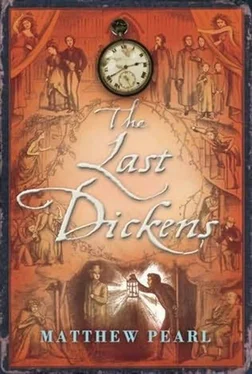Tom said to the dazed Dickens, “Chief, what is it you said to her?”
Dickens nearly fell headlong into his protector's arms from exhaustion and relief, leaning on him bodily. “Never mind that. One of our devils is at peace, Branagan.”

THE NEW YORK PRESS HAD ARRANGED TO GIVE A CELEBRATORY dinner to the novelist before his departure, to be held at the famed Delmonico's restaurant. He was suffering again from severe swelling in his right foot-erysipelas, according to a local doctor-and only upon application of special lotions from the best drugstore and painful bandaging, hidden by a borrowed gout stocking sewed over in black silk by Henry Scott, did the writer go out. Dickens said, as he ground his teeth, that he did not want the pressmen to telegraph England about the extent of his maladies.
“Points of difference there have been, points of difference there probably always will be, between the two great peoples,” Dickens said after the many toasts to his health at the long table. “But if I know anything of Englishmen-and they give me credit for knowing some-thing-if I know anything of my countrymen, gentlemen, the English heart is stirred by the flutter of your stars and stripes as it is stirred by no other flag that flies except its own. I beg to bid you farewell, and I shall often remember you as I see you now, equally by my winter fireside at Gadshill, and in the green English summer. In the words of Peggotty from Copperfield , ‘My future life lies over the sea.’ God bless you, and God bless the land in which I leave you”-Dickens paused there, a tear in his eye-“forevermore.”
All two hundred pressmen, having finished with their special literary menus of timbales à la Dickens, agneau farci à la Walter Scott , and côtelettes à la Fenimore Cooper , stood to cheer. The restaurant band played “God Save the Queen.”
“I feel like erecting a statue to your stamina, my dear Dickens,” Fields said into his author's ear as he shook his hand and helped him away.
“No,” the Chief said somberly, “don't. Take down one of the old ones instead.”
AFTER HEARING ABOUT his heroics in Boston, Dolby had given many hearty congratulations to Tom, very nearly apologizing to him for having doubted. He insisted Tom search for Louisa's accomplices.
“There were none,” Tom said.
“Impossible! That little lady…” Dolby replied, still flabbergasted by it all.
“Obsession of a strong-hearted woman, Mr. Dolby, can be more dangerous than ten men.”
On their final night in America, Dolby confided to Tom about a remaining worry: the threats of the tax collector who had accosted him at the hotel. Dolby asked Tom to help watch out for any trouble.
The warning of the tax agent, whether bluster or not, had stuck in the manager's mind. You will pay, or you, each one of you , Agent Pen-nock had said to him, your beloved Boz included, will be locked away as a hostage before your steamer leaves the shore. Would the novelist, in his weakening health, survive imprisonment if it came to that? A squalid place like the debtor's prison he had seen his father endure in Marshalsea in his youth?
“I shall have the letter from the Treasury chief on my person at all times, in case,” Dolby said.
“Then there shouldn't be any trouble, I'd think,” Tom responded.
“I hope not,” said Dolby. “But it seems many Americans prefer not to respect authority.”
It was only when they boarded the Russia the next morning without incident that Dolby finally smiled for the first time in what seemed weeks. The porters pulled up not only their luggage but the many gifts of portraits, bouquets, books, cigars, and wine.
While the ship was still anchored in the harbor boarding passengers, they sat down to a lunch of some hot soup in the saloon of the ship. Yet before a bit had been taken, there was a commotion on deck. Dolby found several passengers pointing out a police vessel coming in their direction.
As Dolby made his way down the stairs to investigate, the manager faced two men in dark suits and sealskin caps on board, though the police vessel had not yet reached them. They both unbuttoned their coats and revealed shiny brass Treasury Department badges. Dolby, sucking in his breath, removed the letter of protection from the commissioner of Internal Revenue.
The agent who had visited him before, Simon Pennock, emerged to take the letter and read it. He slowly looked up from it and met Dolby's eye. Then he tore the letter and ground the pieces into the floor with his boot toe. “That is what I think of that.”
“Sir!” Dolby said. “That is the official word of the chief of your department. Your superior! He assures me that neither Mr. Dickens nor myself is liable for any tax in this country.”
Pennock sneered an ugly sneer. “Let me make this case clear to your frozen British brain. We don't care a miserable damn for the opinion of the chief of my department, as you call him. With the president under impeachment, there is no government, no department. Only justice and injustice, and we stand before you now as judges.”
“Mr. Dickens would be the last man in the world to evade a claim upon him if it were just!” Dolby thought to try his last tactic. “Is it Irish blood that makes you hate Mr. Dickens, Agent Pennock?”
“I haven't a drop of it in this body, sir,” the collector said.
“Then why harass us so? Are you driven so mad by base greed?”
“You look for greed?” Pennock asked. “Look no further than your boss, sir. Who comes here for money and deification and wishes to give nothing, not even friendship, in return. Perhaps Mr. Dickens should have taken better care to be courteous to the citizens of this country!”
“Courteous? That man has exhausted himself, has made himself sick b-b-b…”-Dolby struggled with his words-“bringing joy to Americans. What do you m-m-mean?”
“Hold your tongue if it's too oily to talk, Dolby! My dear brother is a fine gentleman of Boston, one of the graybeards among the city aldermen. He has read every book by Mr. Dickens for twenty years. Yet, when he left his card at the Parker House with a letter of introduction upon Mr. Dickens's arrival, the response was a note declining-not even in Dickens's own hand, nay, he could not take the time for that- because your sultan was busy resting. I do not call that courtesy! I call it an insult! I say let the great Boz drink from the dregs of the cup he serves to others!” With that he summoned more of his men up the stairs.
“Halt,” Tom, entering from above, said to two of the men. “State your business.”
“None of yours, likely, Paddy!” said the rougher looking of the pair.
“They mean to arrest Mr. Dickens and myself,” Dolby said shakily to Tom.
Tom, without hesitation, stepped in front of Dolby and addressed the tax men. “Take me instead and let them go. I will stay behind until this is sorted out.”
The rougher sealskin pushed Tom hard in the chest, sending him tumbling down. He stopped himself from cracking his skull open at the last moment by catching the railing.
Pennock removed a pistol from his pocket. “We'll deal with Dolby-and then with Mr. Dickens.”
There had been no chance at escape-the rogue agents meant business. Suddenly, the sounds of heavy boots came from behind Dolby. Four detectives from the police boat, which had just arrived, appeared, their coats also unbuttoned on their badges. They surrounded Dolby and demanded to know the sealskin caps’ business.
“Halloa! We're the Treasury Department,” answered one of the tax agents.
Читать дальше













